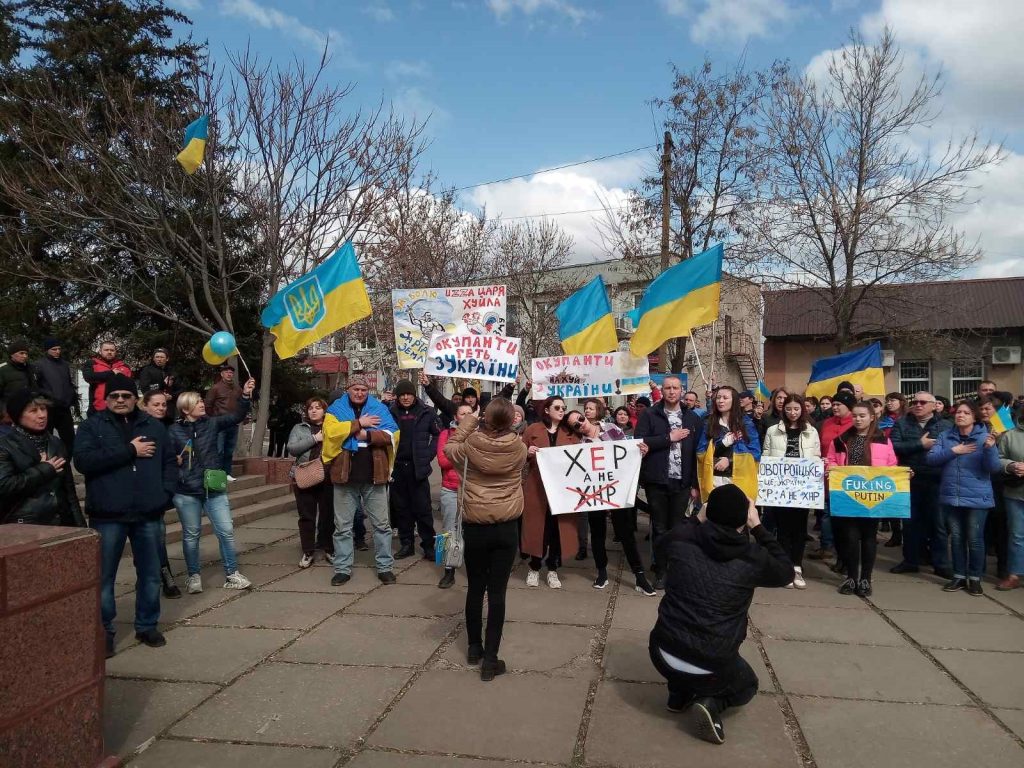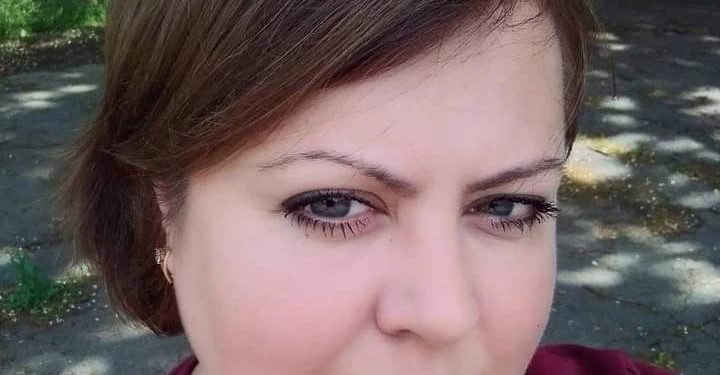Hanna Vodnytska is a journalist from Kherson Oblast, Ukraine, who worked for the local publication Trudova Slava. She endured six months of living under occupation alongside her children. Now, her home is in another part of the country, and she is uncertain whether she will return to her hometown of Novotroitske after her terrifying experiences. Hanna shares her story in an exclusive account for the National Union of Journalists of Ukraine (NUJU).
“I stood there, feeling as if I had been beaten, trying to comprehend what was happening.”
On February 3rd, the atmosphere in the Trudova Slava newspaper editorial office in Novotroitske was buzzing with activity. The team was busy preparing the issue for printing, but for some reason, it felt unusually challenging this time. As the evening approached, the staff gathered for a brief meeting. However, to their surprise, the editor started speaking about something entirely different from work, leaving everyone bewildered.
— Our editor informed us that there was information suggesting that Russia might launch an attack on us overnight. It was so quiet in the room, and we couldn’t believe it. Feeling dazed, we went home, — recounts Hanna.
She couldn’t help but think, “Could something like this really happen?” She had to wait until the following day to verify the editor’s words.
— At 5:30 AM, I was awakened by a call from my sister, who was in Kherson at that time. She said, ‘Sister, the war has started!’ In despair, I rushed out to the street. I heard explosions… The horizon was all red, and the air was filled with the smell of smoke… I was so bewildered, so scared… Tears of desperation… I stood there, feeling as if I had been beaten, trying to comprehend what was happening, — the journalist sadly recalls.
On the first day of the war, all government institutions and shops in the city completely shut down. However, the entire Trudova Slava newspaper team showed up for work in full force.
— Of course, on February 24th, the newspaper that we had managed to send for printing the day before was not delivered. The postal service wasn’t functioning either… It was clear that we wouldn’t be able to continue publishing it. So, we decided to transition to social media, where we hadn’t been active before, — explains Hanna Vodnytska. We created pages on Viber, Telegram, and Facebook, where we provided information on socially significant topics. We shared updates on where to buy bread and which terminals were still operational, as most people used cards for payment. We also informed people about places to purchase flour since it quickly became scarce.
Facing the challenges of the war and the disruption of traditional media channels, the team adapted quickly to using social media platforms to serve the community and provide essential information during those difficult times.

As of the end of March, the presence of militants had increased in the city. On March 25th, the residents of Novotroitske organized one of the largest rallies supporting Ukraine.
— People gathered in the square with national symbols and homemade placards, declaring that Kherson Oblast would never become a part of the self-proclaimed Donetsk People’s Republic, and much more. Together, they sang the Ukrainian national anthem and then marched through the streets to the town council, chanting: ‘Novotroitske is Ukraine!’, ‘Kherson is Ukraine!’, ‘Zaporizhzhia is Ukraine!’, ‘Mariupol is Ukraine!’ We confidently stated that we are true Ukrainians, that we love our Motherland, and we will not allow Russian occupiers to subjugate it, — continues Hanna.
Amid the escalating tensions and the growing presence of hostile forces, the people of Novotroitske displayed their unwavering patriotism and determination to defend their Ukrainian identity and sovereignty. Their unity and resolve in the face of adversity were a powerful message of resistance against the Russian occupation.

The occupants several times attempted to enter the newspaper’s editorial office, forcing them to work with their doors locked.
— They came to our office three times. The first time, they just knocked and left. They tried to open the door the second time but failed, so they left again. Our office was located in the same building as a social institution, separated by doors that had not been used for a long time; we had turned that area into shelves for documents, — the journalist recalls. — On the third occasion, they came and broke down those doors. It seems they were looking for something. Thankfully, we weren’t in the office at that moment since we usually worked until noon and then went home.
“We had the Vasylivka checkpoint ahead, which now, probably, everyone knows about.”
In May, all telephone and internet connections in Novotroitske disappeared, leading to the final shutdown of the newspaper’s operations. However, Hanna was still hesitant to leave until August, when the occupiers began imposing their rules and compelling children to receive Russian education
— Then, they began to prepare as if for the new school year, forming classes and forcing students to learn in Russian. It was clear that nobody wanted to study in a Russian school, so I finally decided that we needed to leave the city, — says Hanna.
Preparing for evacuation was challenging as they were in territory controlled by the occupiers from the early days of the war. Most transporters were only willing to take women, girls, and small boys. Hanna’s son was 15 at that time, so most drivers refused to help. However, the family found their savior in Henichesk, who eventually helped them escape from the occupation.
— We had the Vasylivka checkpoint ahead, which now, probably, everyone knows about. We had heard a lot about what was happening there, but I was shocked when I saw it with my own eyes. It was such a mockery of people! Firstly, everything around was mined: one step to the left, one step to the right, and you could be blown to pieces. Secondly, there were no basic facilities there at all – no toilets, nothing. People had to relieve themselves in the middle of the road or the fields, sleep there, eat there, and stand in line for 5-6 days! I remember we were standing in a queue to leave, and one of the Russian soldiers if you could call him that, approached our car and said, ‘Do you think you are the only one here with children? You will leave if I feel like it; if I don’t, you won’t.’ Then he turned to my daughter and said, ‘Are you scared? It’s right to be scared!’ She burst into tears immediately, and I couldn’t console her for a long time, — recalls the journalist with horror.
“Most importantly, that we are safe and living under the Ukrainian flag”
After escaping from the war, we wanted to go as far as possible. My family found refuge in Ivano-Frankivsk. We rented an apartment and enrolled the children in school. However, the first few months of life in the new place were very challenging. Depression was followed by feelings of guilt and concern for loved ones and acquaintances who remained in Kherson. Additionally, we couldn’t revive the newspaper, even though the entire team relocated to safer regions of Ukraine.
— I searched for a job in my field in Ivano-Frankivsk, but unfortunately, I couldn’t find one. I am deeply saddened that I can’t work as I did before because there are many interesting topics to cover. Currently, I am practicing copywriting and writing articles. I enjoy it and believe it’s never too late to learn. I hope to return to my familiar work one day, — says Ms. Vodnitska.
As for whether she will return with her children to her hometown of Novotroitske in Kherson after Ukraine’s victory, it remains unknown.
— My children have fallen in love with Ivano-Frankivsk and no longer want to leave. Of course, I would like to return home when the opportunity arises, but the most important thing is that we are safe and living under the Ukrainian flag. We don’t know what the future holds, but I am confident that this accursed war will eventually end, — concludes the editor.
The following article features an exclusive account from journalist Hanna Vodnytska, who worked for Trudova Slava in Kherson Oblast, Ukraine, during the Russian invasion. The article describes her experiences living under occupation and the challenges she and her family face. Please be advised that the content may include sensitive topics related to war and its impact on civilians. The account is intended to provide insights into the realities faced by journalists and residents in conflict zones.
This series, titled Executed Free Speech, is created as part of a project Drawing Ukrainian And International Audience’s Attention To Serious Violations Of Human Rights And Crimes Against Journalists And Mass Media By The Russian Federation, which is performed by the National Union of Journalists of Ukraine, with support from the Swedish non-profit organization Civil Rights Defenders.
JOURNALISTS ARE IMPORTANT. Stories of Life and Work in Conditions of War is a cycle of materials prepared by the team of the NUJU with the support of the Swedish human rights organization Civil Rights Defenders.
#CRD

 THE NATIONAL UNION OF
JOURNALISTS OF UKRAINE
THE NATIONAL UNION OF
JOURNALISTS OF UKRAINE
















Discussion about this post